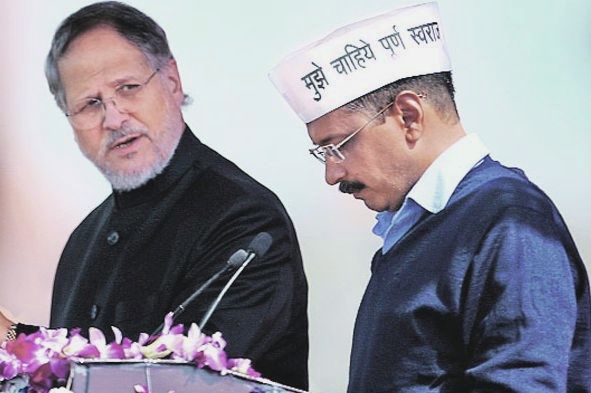Relations between an elected government of Delhi and the LG can never be cordial: It is just the way the relationship is structured.
Aditi Phadnis reports.

Few offer their resignation when it is not sought.
The National Democratic Alliance government concedes it was taken by surprise when Delhi Lieutenant Governor Najeeb Jung quit and announced he would like to go back to academia and the world of books.
For a man who has had a passion for public service from the day he started working, first as a police officer and later as a bureaucrat, this in itself is a surprise.
Never in his wildest dreams could Jung have imagined that he would occupy 6, Ludlow Castle Road, the original address of Raj Niwas, the home of Delhi's lieutenant governor, and that too in such politically charged times.
He has survived Delhi Chief Minister Arvind Kejriwal's attacks (whom, if we are to believe news reports, he won over with paranthas), Subramanian Swamy's barbs and the Congress' unstated disappointment that a man in whom they had invested so much, got on so well with a rival government.
But then Jung has performed as the quintessential bureaucrat, never blotting his copybook by any deviation from the rules, no matter what the colour of the government.
Originally from Hyderabad, Jung's family shifted to Delhi before Partition. It was a joint family and they owned the Golcha cinema in Daryaganj, a stone's throw from Raj Niwas.
Jung lost his father early in life and was brought up by his mother and an uncle. The family believed in modern education and he was sent to St Columba's School. He went to St Stephen's College where he studied history.
His home was an open house for his friends -- both from college and later when he became a bureaucrat.
Jung began preparing for the civil services exams the day he completed his bachelor's degree. He cleared the exam in his first attempt and qualified for the Indian Police Service. He joined the IPS, but took the exam again.
This time he made it to the IAS and opted for the Madhya Pradesh cadre.
That was 1973. Bobby was running to packed houses and it was the year everyone named their daughter Dimple. George Harrison and friends won the Grammy for the Concert for Bangladesh. The average CPI inflation was 16.7%.
As a mere infant in the civil service, Jung could not have known that then prime minister Indira Gandhi would suspend fundamental rights and announce an Emergency two years later.
Jung's real break came in 1984 when Madhavrao Scindia became railway minister in the Rajiv Gandhi government. Scindia asked Jung and another officer, Asif Ibrahim (he went on to become director, Intelligence Bureau, and is currently the prime minister's special envoy on counter-terrorism), to become part of his immediate personal staff.
When Scindia became minister for civil aviation in P V Narasimha Rao's tenure, Jung was no longer available: He was posted as joint secretary (exploration) in the ministry of petroleum and natural gas.
It was here that Jung came into contact with corporate houses. When his tenure in the petroleum ministry came to an end, he did a stint at the Asian Development Bank in the mid-1990s. His -- and others' -- interest in energy took him to Oxford where he did a PhD in energy research.
Then he did what he has done now -- he quit the IAS. A corporate outlook helped: He worked as director, energy research, with the Reliance India Limited-funded Observer Research Foundation, having worked in London earlier with Reliance Global Management Services.
He returned to India in 2008-2009 and was appointed vice-chancellor of Jamia Millia Islamia by then human resource development minister Kapil Sibal, overlooking the claim of Mushirul Hasan, already in situ.
Jung ran the university with an iron hand, sacked many students and also some teachers. One of the teachers described his tenure as an 'obstacle course.' Then, he was appointed lieutenant governor.
This was not an easy tenure, but he sailed through it.
What it did bring out, however, was that relations between an elected government of Delhi and the LG can never be cordial: It is just the way the relationship is structured.
His run-ins with the state government are too many to count. But he stayed unflappable and kept his cool.
That he stayed through one Lok Sabha election in which the government changed, two assembly elections and all the shenanigans of the Aam Aadmi Party government, including the arrest of a large number of members of the legislature party, illustrates this quality.
It will be interesting to follow his career now. Is the government considering him for the job of the next vice-president?
IMAGE: Najeeb Jung, then Delhi's lieutenant governor, with Chief Minister Arvind Kejriwal












 © 2025
© 2025